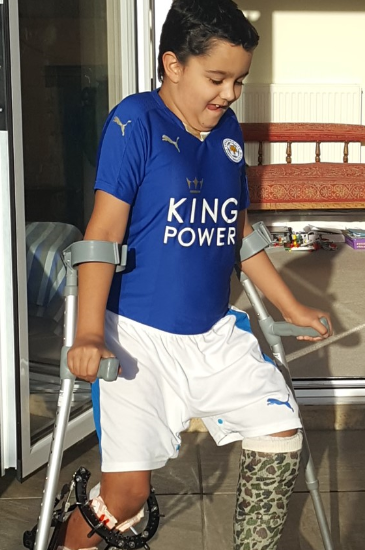
Almost nine years ago, when Jothi was only eighteen months old, he became very ill. Jeff and his wife Bharathi had difficulties getting the correct diagnosis. They had taken their baby son to the GP and hospital, then A&E. Each time they were told that it was likely to be a virus and to bring him back if he wasn’t better in a few days. Jothi eventually vomited, developed a very high temperature, had a high-pitched cry, very cold feet and hands, so his parents took him to A&E but they were sent home again.
Despite that, Jeff and Bharathi trusted their instincts and they returned to the hospital in the middle of the night. Jeff says: “When we reached the hospital the doctors took one look at Jothi and all hell broke loose. There were lots of people around him and they asked us to move out of the way so they could treat him. More staff arrived and they worked urgently to save Jothi’s life which by now was hanging by a thread. He was then transferred in an ambulance to the Evelina Children’s hospital in London. Jothi’s condition remained life threatening as he had multi-organ failure and severe sepsis but he fought his way through the crucial period and gradually started to improve.”
Jothi had been diagnosed with pneumococcal meningitis and sepsis. When he came out the hospital three weeks later, he had lost the ability to walk and could not even hold his head up. It took him several months to regain his strength and to re-learn to sit up, crawl and walk.
Initially Jothi seemed to make a remarkable recovery, but five years later his parents noticed he was limping and his legs were bending a little. It turned out that the meningitis and sepsis had damaged the growth plates in his knees and ankles that help the legs grow. Jothi had two major surgeries that involved separately breaking both legs and placing them in a metal frame to straighten and lengthen them. Jothi is now ten years old and will need these operations on his legs and left thigh every two to three years until he stops growing.
Jeff says: “Meningitis is a life changer and life finisher. It moves quickly and can be difficult to detect with a devastating impact. The disease has changed our lives forever. The leg breaking and stretching operations that Jothi has to undergo are hugely painful and stressful and significantly limit his mobility, his ability to go to school and activities with his friends. We have adapted our house, taken large amounts of time off work and for months on end, it completely dominates our life.”
"MRF has provided us with valuable help, please support their 12 Days of Christmas campaign to help stop other families suffering from the vicious disease that is meningitis.”